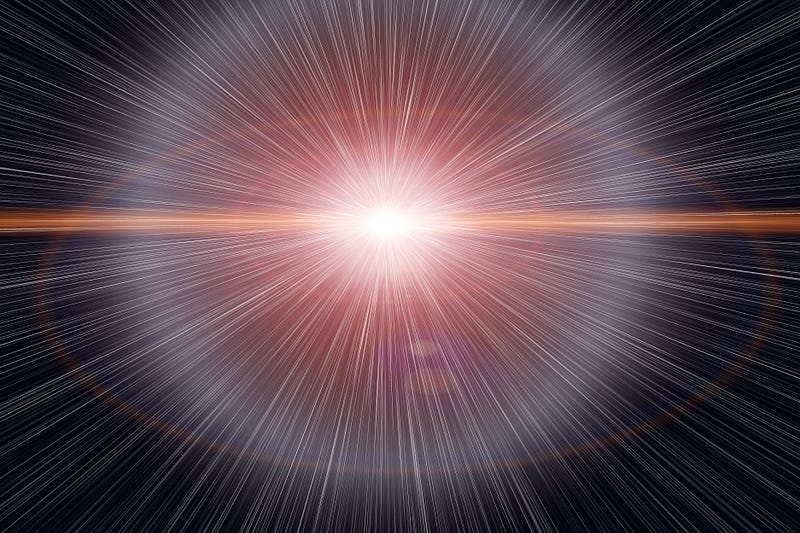A Deep Dive into the Mystical Connection Between God and Nothingness
Written on
Chapter 1: Understanding the Enigma of Nothingness
The notion of nothingness has been a subject of extensive philosophical and scientific exploration. Despite its frequent appearance in our dialogues and thoughts, grasping the essence of nothing remains a formidable challenge.
Unlike tangible entities or observable phenomena, nothingness cannot be directly tested or experienced. It exists solely in the realm of abstract thought and negation.
Defining the Concept of Nothing
Articulating what nothingness is requires identifying what it is not, making the task quite complex. This intricate idea prompts us to reconsider our notions about existence and the boundaries of our comprehension. The moment something comes into being, the idea of nothingness becomes irrelevant.
To foster clearer discussions, it is essential to clarify what is meant by nothing. The term is often employed to illustrate various concepts such as loss, silence, and barriers. For example, it may refer to loss, as in "my house burned down and I have nothing left." It can also denote silence, as in "I said nothing," or describe obstacles, as in "nothing will impede me."
Each of these instances of the term "nothing" conveys a unique idea. The first reflects the absence of physical belongings, the second denotes a lack of verbal communication, and the third signifies the absence of hindrances.
In essence, nothing can stand against us.
While these uses imply a lack, the specific nature of what is missing varies. It's important to note that none of these meanings imply an absolute absence of all things.
When someone loses their home, they still possess something, even if it's merely their life. The individual who claims to have said nothing likely communicates through their body language. Finally, the person asserting that "nothing will obstruct them" does not mean that absolutely nothing will stand in their way; rather, they will navigate through challenges.

When believers use the term nothing to describe the universe's inception, they refer to a state that lacks everything, including the laws of physics. In this scenario, nothing is not a physical entity; it transcends time and space.
Since nothing cannot occupy a point in our universe, it defies perception or testing. It cannot be touched, tasted, or experienced; it remains a purely conceptual idea for contemplation.
God and nothing exist beyond temporal and spatial confines; thus, if you show me nothing, I can reveal God.
One could argue that we encounter varying degrees of emptiness. For example, when alone in a room, surrounded by walls, a ceiling, and a floor, one is encompassed by nothing except for the room itself (along with gravity, air, and perhaps dust).
Similarly, an astronaut floating in the vastness of space might be closer to experiencing nothingness, yet they too are enveloped by numerous elements.

The question remains: can we truly equate the experience of varying degrees of nothingness with the understanding of absolute nothingness? Is it rational to assert that we comprehend nothingness when it indicates an absence of everything?
Theists often argue that when someone states that nothing initiated the universe, they actually mean "not anything." Conversely, if an individual claims that gravity caused the universe's emergence, they suggest that because gravity is a tangible force, it cannot be categorized as nothing.
Therefore, theists frequently contend that the assertion “absolutely nothing created everything” is problematic. Ironically, most people are not attempting to make that claim, including those they debate against.
Interestingly, the same believers who argue that nothing cannot create anything often question why nothing isn't spontaneously generating objects, suggesting that nothing can and does exist within our universe. It would be fascinating to understand where they believe this nothing originates that has the capacity to create entire universes.
Scientists find it perplexing that theists assert they have identified nothing.
Based on a strict definition of nothing, it seems clear that possessing both something and nothing simultaneously is impossible. The moment something comes into existence, nothing ceases to be nothing.
It’s conceivable that our universe exists in a domain beyond nothingness, and if nothingness possesses the ability to spawn new universes, this could provide a compelling argument for the existence of multiple universes.
Ultimately, the concept of absolute nothingness is as philosophical as that of a deity. No one has ever encountered or witnessed a god, just as no one has genuinely experienced pure nothingness.

While nothingness and deities bear certain similarities in their existence, a significant distinction sets them apart: nothingness has never inspired followers who sought to convert, dominate, or inflict harm in its name.
Though some may assert they have encountered a god through emotional or spiritual experiences, such encounters are akin to someone sensing nothingness by being in an as-empty-as-possible room. Belief in a deity or nothingness is ultimately a matter of personal conviction, not empirical evidence or feasibility.
Consequently, individuals are free to believe as they choose, but they should not impose their beliefs on others. Moreover, if they wish to avoid criticism of their beliefs, they should keep them private.
I possess nothing, and you cannot take that from me.
Essentially, when theists engage in discussions about the universe's origins by adhering to the exact definition of nothing, they find themselves arguing two opposing yet strikingly similar viewpoints simultaneously.
Both the idea of a deity and the notion of absolute nothingness remain unfalsifiable and cannot be substantiated through empirical means. They are both thought to exist beyond the limitations of space and time.
While we may attempt to associate other ideas and concepts with them, the chasm between our human experiences and what these ideas are believed to signify is so vast that it would be an understatement to label it merely a leap of faith.
Thus, it appears we've arrived at a convoluted conclusion that leads us in circles. Ultimately, we may conclude that both nothingness and deities share a common trait—they can both be dismissed as entirely nonexistent until proven otherwise.
Chapter 2: Exploring the Mystical Union
In this video titled "Nothing can separate us from God," the discussion revolves around the spiritual connection between the divine and the concept of nothingness. It delves into how this bond shapes our understanding of existence.
Chapter 3: The Nothingness of God in Mystical Traditions
This video features Bernard McGinn discussing "The Nothingness of God in Jewish and Christian Mysticism." He explores how these traditions interpret the idea of God as a form of nothingness, illuminating the mystical dimensions of belief.